Popular Reads
Top Results
Can't find what you're looking for?
View all search resultsPopular Reads
Top Results
Can't find what you're looking for?
View all search resultsFinance ministers and the beautiful game
In soccer terms, finance ministers' strength lies in their ability to connect the lines, distribute the ball and ensure that the team moves in a coordinated way.
Change text size
Gift Premium Articles
to Anyone
I
n almost every country, finance ministries carry the unenviable responsibility of keeping the economy stable while managing the nation’s purse. They are simultaneously expected to be guardians of fiscal discipline, architects of growth and negotiators among competing political demands. This job is as technical as it is political.
To explain this role, let me borrow a metaphor from the world’s most beloved sport: soccer, the “beautiful game.” The analogy is surprisingly apt. Some finance ministers like to think of themselves as strikers: visionary leaders who score goals by launching bold reforms or cutting debt dramatically. Others see themselves as goalkeepers, constantly under siege from crises, guarding against deficits and speculative attacks.
Yet in truth, the most effective finance ministries are more like midfielders. They rarely receive the glory of the striker or the spotlight of the goalkeeper. Instead, their strength lies in their ability to connect the lines, distribute the ball and ensure that the team moves in a coordinated way.
Just as in soccer, no one player, however brilliant, can win the match alone. Similarly, no finance ministry, however powerful, can achieve fiscal sustainability or economic transformation in isolation. The work of finance ministries requires teamwork, strategy and communication.
Like any soccer team, finance ministries must first get the basics right. In soccer, it is impossible to win without fitness, defensive organization and discipline. Likewise, for finance ministries, the fundamentals include credible budgets that are based on realistic assumptions rather than political wish lists, predictable and well-controlled budget execution that prevents waste and leakage, sound cash and debt management to ensure liquidity and safeguard creditworthiness and accurate accounting and transparent reporting systems so that governments can be held accountable.
Without these basics, even the most well-intentioned reforms will falter. A midfielder who cannot pass accurately is of little use, no matter how ambitious his vision.
But mastering the basics is only the beginning. The finance ministry's true art lies in its ability to connect, convene and communicate.



















